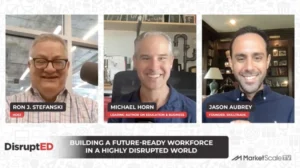Restaurant Innovation Summit Unveils Latest Industry Trends
Even the most mundane restaurant is unique in some fashion. The hospitality industry is one where no two workspaces are the same, but every business ultimately has the same end goal of providing a quality product that generates revenue. However, the ways restaurants go about achieving that goal is often as diverse as the different businesses that make up the industry.
On Nov. 7 and 8, restauranteurs and technology providers congregated at the Empire Room in Dallas, Texas for the National Restaurant Association’s Restaurant Innovation Summit (RIS) to discuss how the industry can move forward.
According to RIS Program Director Laura Chadwick, 50% of Americans eat food from a restaurant at least once a day, but with delivery and pick up options changing, the industry must adapt to changing consumer needs.
Attendees brought with them some of the latest products to hit the market and noted the value of a gathering for like-minded professionals.
“What’s interesting about this summit is the focus on the technology of today and they’re also focusing on the technology of tomorrow,” Laura Martin, Executive Brand Strategist for Lava GEL said. “It’s important to know where we are, look at new innovations in the marketplace, but really have some more of that future, forward looking to understand where things are headed.”

Martin was at the conference to display Lava Gel’s new ‘H-EATS’ product line, a self-heating, fireless technology that produces warmth on a curve, ideal for commercial or personal catering due to its ability to maintain food temperature and consistent quality.
Innovations like H-EATS, which uses Lava Gel’s mineral-based technology originally implemented in spas and the medical field are indicative of what the conference was looking to discover.
Not every presenter came from a restaurant or food company, however. Perhaps the most transformative alteration coming to the hospitality space is the 5G network. Jay Melone, Sales Vice President, Restaurant Practice Lead at AT&T led a discussion on the impact a faster, more connected mobile network will bring to businesses and restaurants in particular.
“In a 5G world, speed is going to significantly increase, latency is going to significantly reduce and then edge computing is going to change and edge computing is going to be in network nodes as well, and that is going to help people create much more efficient applications,” he said.

Speed and efficiency are optimal traits of any business and 5G stands to help restaurants significantly.
“Those different experiences that keep evolving are creating the need for connectivity anywhere at any time, and I think 5G will help enable that in a phenomenal way,” Melone said.
Shane Wheatland, Chief Marketing Officer at Omnivore, a company that connects restaurants to technology, said some restaurants can survive off of reputation and service, but the future is brighter for innovators in the space. This is why he believes conferences like RIS put attendees in a better position.
“I think it absolutely is a detriment if people aren’t evolving and building out that technology platform right now. It’s going to be a bit of a challenge,” he said.

Wheatland explained that there are currently three camps of restaurants today when it comes to technology implementation. There are those that are perennially innovating, those that want to but are unable for various circumstances, and those that are reluctant to change.
There may be different schools of thought on how to run a successful business or restaurant, but Wheatland said RIS is a place where anyone can at least learn about what their contemporaries are up to.
“I think conferences like this really help validate people’s thinking, inspire some new thinking, and hopefully it makes people move quicker,” Wheatland added.
Conferences like RIS exist to put attendees in a position to implement the most relevant technologies into their business. Technology itself cannot improve an organization but by attending RIS industry leaders can make sure they get the most out of the latest offerings available to them.
“Restaurants operate on extremely thin margins of 3-6 percent so there’s a natural hesitancy to jump on a technology bandwagon,” Chadwick said. “So, events like the Restaurant Innovation Summit are an opportunity to get restaurants comfortable with technology, to set them up for success when they finally do make that big decision.”
The next fundamental change to the dining experience may not be known right now, but whatever it is, it may very well be discussed first at the next Restaurant Innovation Summit.
Follow us on social media for the latest updates in B2B!
Twitter – @HospitalityMKSL
Facebook – facebook.com/marketscale
LinkedIn – linkedin.com/company/marketscale








